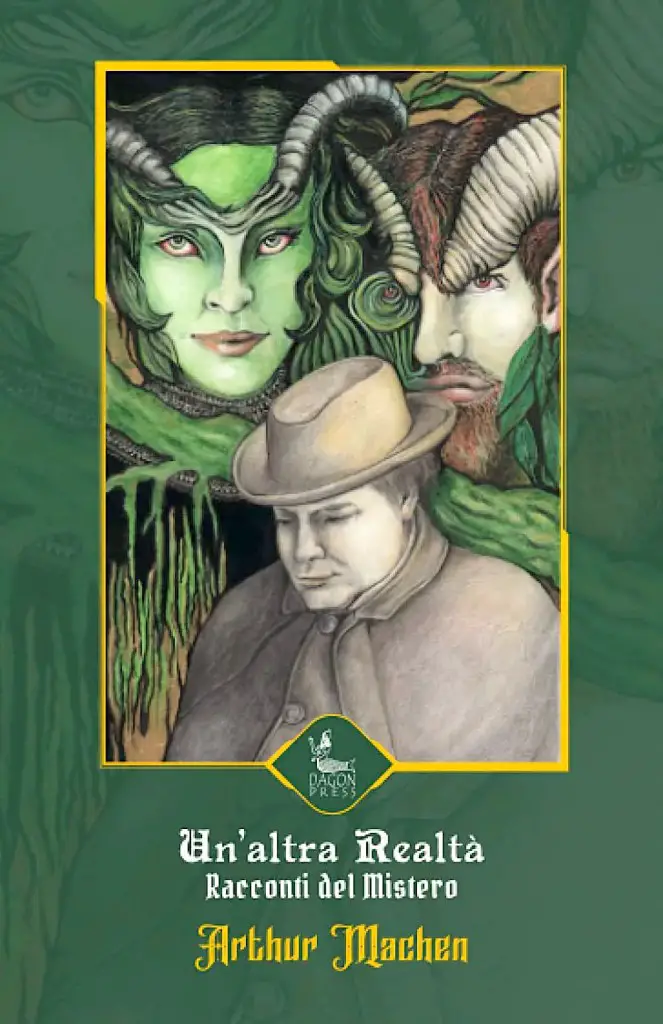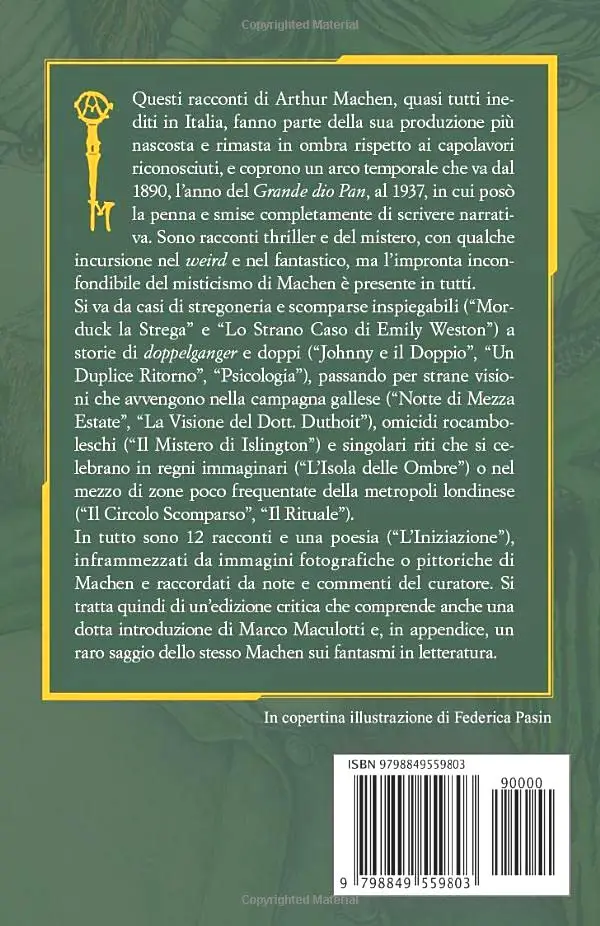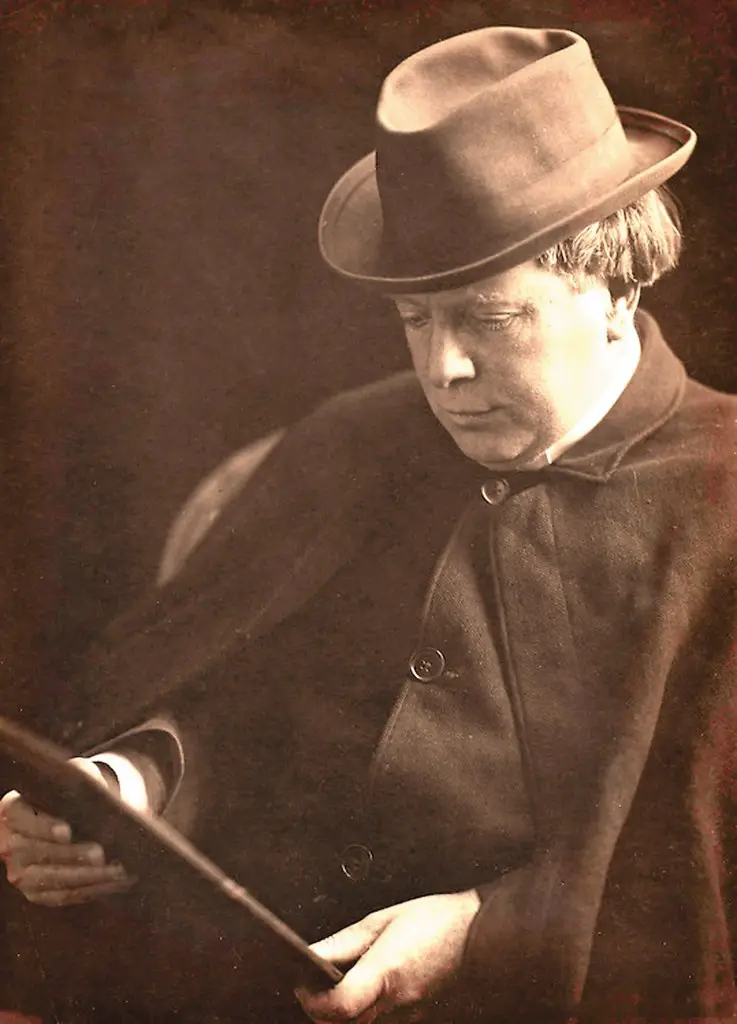The new volume – Another Reality. Tales of Mystery – edited by Pietro Guarriello and published by Dagon Press, presents a selection of mysterious unpublished Machenian texts, which allow us to deepen some characterizing aspects of the Welsh writer.
di Lorenzo Pennacchi
Then finally
the glory of the goddess was revealed.
[1]
Until recently, a common fan of fantastic literature would have associated the name of Arthur Machen al Great God Pan and White people. Or, perhaps, neither of them. In recent years, Machen's production has been rediscovered from various perspectives, also thanks to the constant work of Peter Guarriello and Dagon Press. The fourth issue of the magazine zothique, released in the summer of 2020, is entirely dedicated to the Welsh writer, offering an overview as comprehensive as it is in-depth. As Matteo Mancini points out in his detailed reconstruction:
He was a character who repudiated materialism, completely disinterested in money and material things, suspicious of the usefulness of scientific progress, being anchored to spiritual values that led him to regress to the glories of an ancient past, in a crossroads of cultures between paganism and Christianity, moving from Romanesque to Celtic traditions, to be more interested in things of the other world - the one to which the occultists refer - than in those of the world that marks the rhythms and determines the life choices of most people.
[2]
Another reality. Tales of the Mystery presents twelve short stories, a poem and an essay mostly unpublished in Italy, introduced by a text by Marco Maculotti and from the historical-editorial contextualizations of the curator. In the punctual introduction Maculotti, which has reached the umpteenth Machenian publication in just a few years, highlights the author's main biographical traits, Howard Phillips Lovecraft's profound esteem for him, as well as the use of the disturbing idiom defined cosmic Gaelic o fairy language.

The stories, which cover a period of almost fifty years, are strongly characterized by a veil of mystery and by an aura of otherness with respect to the material world. Moreover, at the beginning of the essay that gives the collection its title, Machen writes in no uncertain terms: «People who are certain that there is nothing but matter are mediocre; and the very wall against which they lean behaves in a strange way, threatening to turn their backs first in the direction of energy, and then of the mind» [3].
It is therefore not surprising that one of the central themes of the collection lies in the relationship with oneself and in the search for one's own individuality. In Johnny and the double, released in 1928 and defined by a reviewer of the time as a story "unusual enough to give a thrill" [4], Machen investigates the figure of the Doppelgänger through a young protagonist capable of doubling himself and finding himself in two different places at the same time, sometimes in macabre scenarios.
The metaphor of the double is approached from another perspective in one of the shortest texts in the volume, Psychology, published in the collection Ornaments in jade in 1924, composed of ten mystical prose poems. In this intense fragment Machen relates the context of a quiet London neighborhood to the convulsive existential reflections of a writer, animated by rage, dreams and madness. The narrative, which revolves around theprofound unfathomableness of human nature, ends with a paradoxical question: "And every day […] we lead two lives, and half of our soul is madness, the other half a sky illuminated by a black sun. I say I'm a man, but who's that other one hiding inside me?» [5].
London, it was said. After all, for Machen, individual research is closely connected to the surrounding environment, sometimes implying its fusion. As Maculotti pointed out in his previous contribution «in the Machenian mythopoeia the territory is transmuted into a 'landscape that shatters the protagonist's ego [...] through contact with the Ancient as well as with the surreal and the supernatural'» [6]. The environments to which Machen refers are essentially two: on the one hand the city, on the other the rural and ancestral nature. London on the one hand, Wales on the other. As Guarriello reports, according to Nick Freeman:
Unlike some of his contemporaries, Machen did not in any way reject urban life but he never disguised the fact that his adult personality had been shaped by early exposure to what was Far Off Things he called it 'vague impressions of wonder, amazement and mystery', and 'the vision of an enchanted land', far removed from the Victorian city.
[7]

In Another reality this relationship shapes various stories. Through The Phantom of Pentecost Machen's deep bond with the world transpires Beach, a street in the borough of Westminster, where he claims he gasped on a summer walk in 1880: "No man can say that he has really seen London; but at that moment I was very close to his vision» [8].
In Midsummer Night, another short fragment published in the Ornaments, we witness the progressive dreamlike passage of the protagonist Leonard from a terrifying London, a city literally wracked with fever, to an apparently edifying, but soon uncanny natural landscape: «He stepped into the shadows, walking slowly, and let the path take him away from the world» [9]. In this dimension he encounters a procession of ethereal female figures, some of them belonging to his village, who interact with him silently before dissolving into the clearing.
The feeling of panic stupor turns into cosmic terror in the Vision of Dr. Duthoit. Here, following the protagonist's loss of sense of proportion, the spiritual littleness of man contrasts with the infinite vastness of the cosmos, reflected in the emerald maxim «what is above is like what is below"To then reveal itself in all its depth:
It is my opinion that this is a global battle that we fail to understand. There are some who argue that the earthly conflict is nothing more than a reflection of the war in heaven. What if it was reflected to infinity, what if it penetrated to the very depths of creation? What if a speck of dust were a cosmos – an entire universe – of whirling worlds? There may be battles between creatures that no microscope can ever perceive.
[10]
This passage connects directly to the central part of the concluding essay, when the author states that "nothing is more irritating than an occultist speaking with the certainty of an analytical chemist» [11], rather suggesting to investigate the human cosmos as if it were a world yet to be discovered, «the center of a power of which we know almost nothing» [12].
With this spirit Machen outlines his stories, ranging from the narrative rewriting of the Crippen crime in the Islington Mystery to the hellish scenarios ofIsle of Shadows and the scandalous trial of Morduck the Witch. He does it with his style, indebted to Robert L. Stevenson (The missing circle) and appreciated by Oscar Wilde (A twofold return), who admires the terrifying innovator Algernon Blackwood and, somewhat surprisingly, accuses authors such as excessive academicity Montague R. James and Vernon Lee.
A disturbing pen that intersects with the socio-anthropological fabric of reference, as in rituals (one of his last short stories ever), managing to bring out more often than not that feeling typical of the writer of the wonderful: «It seems to us that we firmly believe and, at the same time, unquestionably that we do not believe» [13].

NOTE:
[1] A. Machen, The initiationin Another reality. Tales of the mystery, Dagon Press, 2022, p. 19.
[2] M. Mancini, Arthur Machen: Beyond the veil of the Unknownin Zothique No. 4, Dagon Press, 2020, p. 6.
[3] A. Machen, Another reality, in Another reality, P. 156.
[4] Cit. in A. Machen, introduction a Johnny and the double, in Another reality, P. 127.
[5] A. Machen, Psychology; or scraps of paper, in Another reality, p. 68.
[6] M. Maculotti, The fair ones, atavism and protoplasmic regression, in Beyond the real, Gog editions, Rome 2020, p. 118.
[7] N. Freeman, cit. in A. Machen Midsummer night, in Another reality, p. 60.
[8] A. Machen, cit. in The ghost of Pentecost, in Another reality, p. 72.
[9] A. Machen, Midsummer night, in Another reality, p. 58.
[10] A. Machen, Doctor Duthoit's vision, in Another reality, P. 83.
[11] A. Machen, Another reality, in Another reality, P. 163.
[12] Ibid.
[13] Ibid, p. 158.

A comment on "Arthur Machen's "Other Reality""